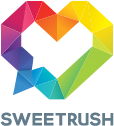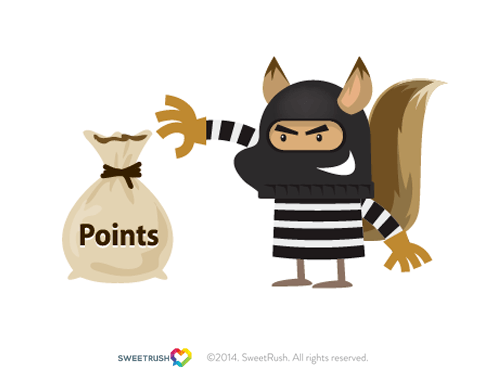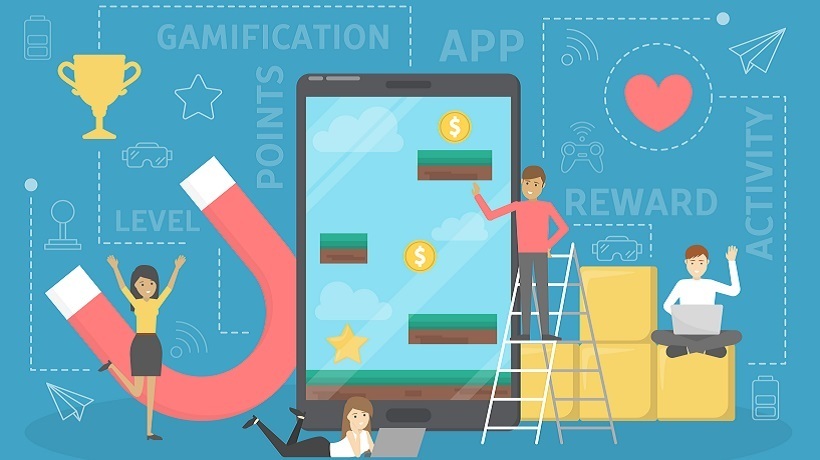Cocoa Trivia: A Gamification and Games-Based Learning Developer Employs Gamification to Engage Its Own Employees
Gamification has been one of the dominant terms in the training industry for several years, and at this point it’s certainly more than just a buzzword. Corporate training courses, even the most routine ones, are enriched by the presence of an engagement component. Advanced and more complex trainings are often packaged as games, in which learning blends with entertainment.
As experts in gamification for corporate training and games-based adult learning, we feel lucky and privileged that our job is to develop creative and engaging programs for our clients and their learners. Through instructional design, game design, multimedia, and engineering, we create memorable learning experiences that employees look forward to, have a lot of fun with, and talk about with their colleagues. We see the impact on engagement, retention, and culture within our clients’ organizations.
So, as gamification transforms the training industry, and SweetRush continues to “gamify” the corporate world, how do we successfully bring gamification mojo to SweetRush?
There’s no lack of fun within the SweetRush culture, so we couldn’t resist when we saw an opportunity to bring a gaming element into our daily work. We knew we’d be able to impart knowledge and build the SweetRush culture, and at the same time make it fun.
Cocoa Trivia: Gamification for the Gamifiers
Cocoa is our unique proprietary release and portfolio management system. Developed internally, the system allows our team to easily manage dozens of courses simultaneously in development, as well as maintain our extensive archive of past projects.
We decided to add gaming features, which we call Cocoa Trivia, to this popular tool. The idea behind the game is simple: it’s essentially true-or-false trivia, but it has several interesting twists that amp up the gaming factor and its value:
- Engaging and entertaining
- Educational
- Culture enhancing
- Deviously competitive
- Collaborative
- Non-intrusive
An ambitious list, really, but the ROI clearly validates this effort. Cocoa is a tool touched by almost everyone in production, and by gamifying Cocoa, we turn an everyday administrative tool into an engaging learning experience.
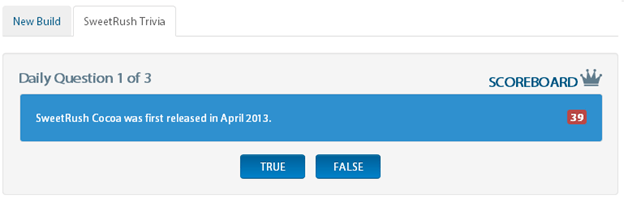
A sample question in SweetRush's Cocoa Trivia. Users can answer five consecutive questions, plus a final Double or Nothing challenge, each day.
Engaging and Entertaining
As you come to Cocoa’s main page, you’ll see a trivia question right there, woven into the interface. This is just a brief true-or-false question, so you can’t help but to answer, and, of course, you want to get it right. Another question comes right on the heels of the first one, and then one more.
Each question is scored (or weighted) differently, depending on its complexity. You stand to gain or lose the point weight of the question, which means you can end up with a negative score. If your score is positive, after three questions you can risk it all by answering the “Double or Nothing” challenge.
Note that you do this all within the interface of the tool, and once you are done you can continue with your initial tasks. Or, you are free to ignore the trivia and turn it off. No worries—your questions will be waiting for you when you return and are in the mood to play.
Deviously Competitive
As mentioned earlier, you score (or lose) a different number of points for each question; each question has a different weight, which is randomly chosen between 1 and 100. Naturally, there is a scoreboard that keeps track of the rankings and promotes healthy competition among the SweetRush team.
The devious part presents itself as a unique feature of the scoreboard. Once a day, any player with a positive point value can attempt to steal points from another player.
Here’s how this works:
1) Choose one of the names on the scoreboard as your “victim,” and initiate the steal.
2) Choose whether you want to steal openly or anonymously.
- In an open steal, you stand to gain more of your victim’s points if you succeed, but greater reward also means greater risk. A taunting e-mail (automatically generated) will be sent to your target, revealing not only what was done, but by whom, thus making you a target for a potential counter-steal.
- In an anonymous steal, your payday is smaller, but the victim will not know your identity.
3) Answer a true-or-false question from the pool to perform the steal. If you get it right, a sizeable percentage of your victim’s score goes to you. If you get it wrong, prepare to make a donation in the opposite direction.
Educational
The trivia creators wrote a large pool of questions, consisting of two categories. The first category includes questions about SweetRush processes, policies, and facts that we want our folks to know. The second category quizzes you on SweetRush history and details of the past and active projects, and then reveals interesting facts about your co-workers. This is especially valuable in our virtual culture, where many of us have been working together for years without sharing the same office. Knowing more about our co-workers helps us understand one another even better, while brushing up on the vast SweetRush body of knowledge will carry an obvious professional benefit.
Collaborative
During the game development, and continuing over time, all SweetRushians have the opportunity to contribute to the ever-growing question pool. When we first built the database, the team did not know why we were collecting these trivia facts. Everyone on the team was asked to submit facts about themselves or their co-workers, or about SweetRush. Each fact was then twisted or a counter or misleading answer was written to create a matching false “fact,” thus doubling the number of questions in the pool.
Now that the game is live, each player is able to supply additional facts in exchange for extra points as part of the gameplay. We are, of course, hoping for active participation, so the game will continuously self-populate with additional content. A never-ending shelf life!
Non-intrusive
Once we solved the challenge of engaging the players, we faced another challenge—how to prevent the loss of productive working time. In other words, what is to stop an addicted player from spending long periods of time on this trivia, while forgetting about work?
To solve this, we decided to make sure that the experience is not only pleasurable, but also limited. There is a set number of questions that can be played per day. Users are given only five consecutive questions, plus a final Double or Nothing challenge. After that, the next question for this user will appear only after the daily session is refreshed at midnight. In addition, only one scoreboard steal is allowed per day.
This means users can finish their daily set of questions in a minute or two, ensuring no loss of working time, but they’ll want to come back the next day, hungry for more.
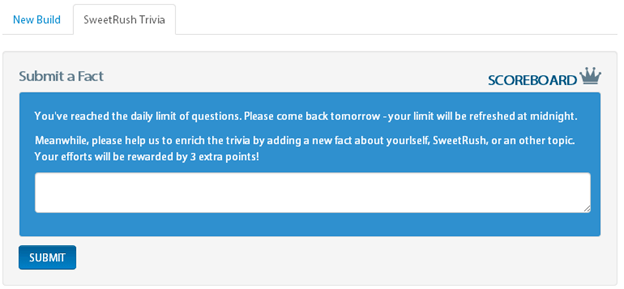
Each player is able to supply additional trivia facts in exchange for extra points - so the game will continuously self-populate with additional content!
Simply put, Cocoa Trivia has taken an everyday task and raised the bar: enhancing our culture, educating in a painless way, and keeping everyone aware of the value of gamification.
If I’ve piqued your interest about SweetRush’s expertise in gamification, I highly encourage you to take a look at these popular blog posts from our thought leaders:
- Creative Director John-Carlos Lozano writes about “What Makes a Good Learning Game?”
- Senior Instructional and Game Designer Cindy McCabe discusses “Gamification in Business: How Learning and Development Can Take It Beyond the Hype.”
- Solution Architect Erin Krebs enlightens us on “4 Lessons McDonald’s MONOPOLY Teaches about Learning Games.”
